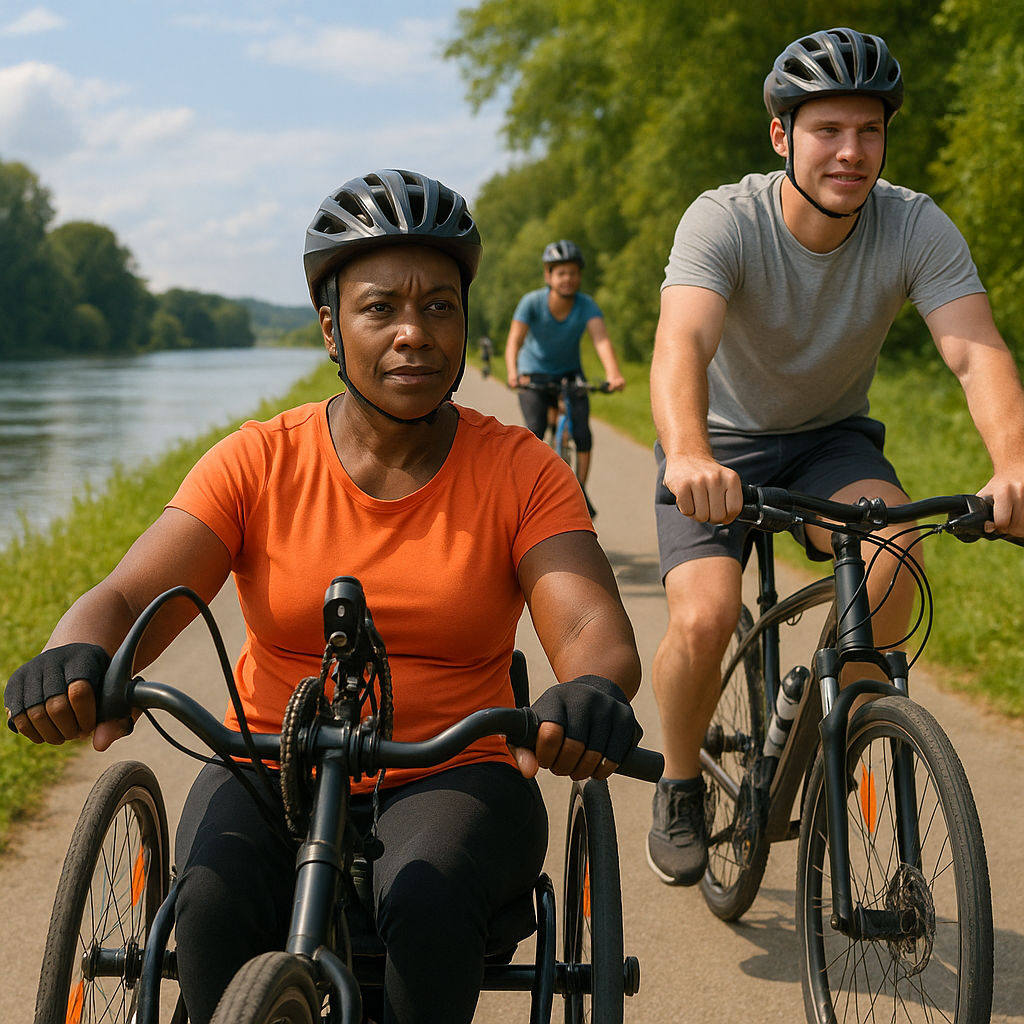Why Cycling Might Be the Mental Health Hack You're Missing
In a world where mental health challenges affect one in four people globally, the search for accessible wellness strategies has never been more urgent. While therapy and medication remain crucial for many, emerging research points to a surprisingly powerful tool that might be sitting in your garage right now: the humble bicycle. Cycling for mental health represents more than just physical exercise—it's a multidimensional activity that engages the mind, body, and spirit in ways uniquely suited to combat modern mental health struggles. Though most people recognize cycling's cardiovascular benefits, its profound psychological and emotional advantages remain surprisingly underutilized, despite growing scientific validation.
Throughout this article, you'll discover the science behind cycling's mood-boosting powers, learn how it differs from other forms of exercise, explore its benefits for stress, anxiety, cognitive function and social connection, and gather practical tips for incorporating cycling into your mental wellness routine.
How cycling impacts the brain and mood
The mental health magic of cycling begins at the neurochemical level. When you pedal, your body initiates a cascade of beneficial reactions that directly influence how you feel and think.
During sustained cycling, your brain releases significant amounts of endorphins—natural mood elevators that create feelings of pleasure and reduce pain perception. These are responsible for the euphoric sensation cyclists often report, similar to the famous "runner's high." However, the neurochemical benefits extend further. Cycling also triggers releases of serotonin and dopamine, critical neurotransmitters that regulate mood, motivation, and feelings of well-being. Research from the University of Illinois found that even a single 30-minute cycling session can elevate these mood-regulating chemicals for hours afterward.
Regular bike riding also increases levels of brain-derived neurotrophic factor (BDNF), a protein that supports the survival of existing neurons and encourages the growth of new neurons and synapses. Dr. Kelly McGonigal, health psychologist and author, explains that "aerobic exercises like cycling can increase the volume of the prefrontal cortex and hippocampus, regions involved in thinking and memory."
Cycling vs. other exercises: what's unique?
While all exercise offers mental health benefits, cycling provides several distinct advantages that set it apart from other activities. Unlike high-impact sports that can strain joints, bike riding delivers cardiovascular benefits without the physical stress, making it sustainable for daily practice.
The rhythmic, bilateral movement of pedaling creates a uniquely meditative experience.
This repetitive motion engages both hemispheres of the brain in a pattern that many cyclists describe as mentally soothing. Unlike activities that require constant decision-making or vigilance, cycling allows the mind to enter a flow state while maintaining just enough awareness of surroundings.
Cycling typically occurs outdoors, providing the added benefit of nature exposure—a proven mood enhancer on its own. Even brief contact with natural environments has been shown to reduce rumination and negative thought patterns. Urban commuter cycling, while not always serene, still offers more environmental stimulation and vitamin D exposure than indoor exercises.
Additionally, cycling combines transportation with exercise, addressing two needs simultaneously. This efficiency makes it more sustainable as a daily habit than activities requiring dedicated time slots, especially for busy professionals. Alongside proper locking techniques, using secure equipment allows riders to fully immerse in the experience without worry.
Cycling as stress relief and anxiety reducer
In our high-pressure world, finding effective stress management tools is essential. Cycling stands out as a particularly potent anxiety antidote, offering both immediate relief and long-term resilience building.
Regular bike riding helps regulate cortisol—the primary stress hormone—preventing both dangerous spikes and the chronic elevation associated with anxiety disorders and depression. Research published in the Journal of Clinical Psychiatry found that aerobic exercises like cycling can reduce anxiety sensitivity, a risk factor for panic disorders and generalized anxiety.
The physical action of cycling creates what therapists call "behavioral activation"—essentially getting the body moving despite low motivation or anxious thoughts. This interrupts negative thought spirals and provides a sense of accomplishment. Licensed clinical psychologist Dr. Jasper Smits notes that "consistent physical activity like cycling not only provides immediate stress relief but actually changes how the body responds to stress over time, creating a more resilient system."
For many cyclists, the activity becomes a form of active meditation. The combination of rhythmic movement, controlled breathing, and environmental awareness creates an experience similar to mindfulness practices, keeping the rider anchored in the present moment rather than ruminating on past regrets or future worries.
Mindful commuting & time outdoors
Transforming your commute into a mindful cycling experience can bookend your workday with periods of mental reset. To make your ride a moving meditation, try these techniques:
- focus on your breathing pattern, synchronizing it with your pedal strokes
- notice the physical sensations—the wind on your skin, the temperature, the feeling of movement
- acknowledge sounds around you without judgment, simply observing the urban or natural soundscape
- practice gratitude for your body's capabilities and the freedom of self-powered transportation
- set an intention for your ride or your day ahead
Outdoor exercise offers additional stress-reducing benefits beyond the activity itself. Research has documented the "nature effect"—the measurable reduction in stress hormones that occurs when humans spend time outdoors, particularly in green spaces. Even cycling through urban parks or along waterfronts can provide this benefit.
Weather exposure also helps normalize circadian rhythms, potentially improving sleep quality—another crucial factor in mental health. Morning rides with natural sunlight exposure have been shown to improve night-time sleep quality, creating a virtuous cycle for mental wellness.
Cognitive benefits: mental clarity, creativity, and focus
Beyond mood enhancement, cycling offers remarkable benefits for cognitive function that can impact every aspect of daily life. The activity appears to sharpen thinking, boost creative capacity, and improve concentration in ways that extend well beyond the duration of the ride itself.
Research from the University of Illinois has demonstrated that cycling and other aerobic activities increase blood flow to the brain by as much as 15%, delivering oxygen and nutrients crucial for optimal cognitive function. This improved circulation particularly benefits the prefrontal cortex—responsible for executive functions like planning, decision-making, and focused attention.
Many writers, artists, and problem-solvers report experiencing breakthrough ideas while cycling. This creative boost likely stems from a combination of increased cerebral blood flow and what psychologists call "transient hypofrontality"—a temporary state where the brain's analytical centers quiet down, allowing more creative connections to form. Author and neurologist Oliver Sacks famously noted that some of his best thinking occurred while riding his bicycle.
For those struggling with attention challenges, biking provides a unique form of focus training. The constant balance adjustments and environmental awareness required create a state of relaxed attention that can transfer to other contexts. Additionally, the post-exercise cognitive boost can last for hours, making morning or lunchtime rides particularly valuable for knowledge workers.
Commuter cycling may offer cognitive advantages beyond recreational riding. Navigating through changing environments engages spatial awareness, quick decision-making, and adaptability—mental skills valuable in many professional contexts. Unlike passive commuting, where stress accumulates without physical release, active commuting through cycling provides both the physical outlet for tension and cognitive engagement that can make the transition between home and work smoother.
Social and community benefits of cycling
The mental health benefits of cycling extend beyond individual neurochemistry and into the realm of human connection—an increasingly recognized determinant of psychological wellbeing. Two-wheeled activities offer unique social opportunities that combat isolation and build meaningful community.
Group rides create natural social interaction without the awkwardness of forced conversation.
The side-by-side nature of cycling allows for easy dialogue or comfortable silence, making it accessible for people with varying social comfort levels. These riding communities often develop into support networks that extend beyond cycling itself.
Cycling clubs exist for virtually every demographic and ability level, from casual coffee rides to competitive training groups. These communities provide accountability, encouragement, and shared experience—all factors that psychologists identify as crucial for behavioral change and mental health. The community aspect is particularly valuable for individuals going through life transitions or recovery processes.
Urban cycling advocacy groups merge physical activity with civic engagement, creating purpose-driven communities that work toward improving city infrastructure. This combination of exercise and meaningful action can be particularly beneficial for mental health, providing both immediate physiological benefits and longer-term sense of purpose.
The amazing way bicycles change you often includes developing a broader sense of connection to your local environment. Cyclists typically develop detailed knowledge of their neighborhoods and cities, noticing changes and details invisible to car commuters. This environmental familiarity fosters a sense of belonging and place attachment linked to improved psychological wellbeing.
For many riders, cycling communities become important sources of identity and belonging. Whether identifying as a mountain biker, road cyclist, bike packer, or daily commuter, these identities provide connection to larger communities with shared values and experiences.
Cycling accessibility: adaptive cycling and inclusion
The mental health benefits of cycling should be available to everyone—regardless of physical ability, age, or prior experience. Fortunately, innovations in adaptive cycling are making this increasingly possible, expanding access to these powerful wellness tools.
Adaptive cycling encompasses a broad range of specialized equipment designed to accommodate different abilities.
These include hand cycles for individuals with lower limb disabilities, recumbent bikes for those with back issues, tandem bikes for visually impaired riders, and tricycles for those with balance concerns. Electric-assist options further expand accessibility by making cycling possible for people with various energy limitations or conditioning levels.
Research published in the Disability and Rehabilitation journal indicates that participants in adaptive cycling programs report significant improvements in psychological wellbeing, independence, and social connection. The freedom of movement and self-determination offered by adaptive cycling appears particularly valuable for mental health.
Organizations like Cycling Without Age facilitate rides for older adults using specially designed trishaw bikes piloted by volunteers. These programs have documented impressive mental health outcomes, including reduced depression and increased sense of purpose among participants who may otherwise have limited outdoor access.
Making cycling work for every body
Getting started with adaptive cycling might require some specialized research, but resources exist to help match individuals with appropriate equipment:
- local adaptive sports organizations often maintain fleets of various cycle types for trials
- many cities have implemented adaptive bike share programs alongside standard bike share systems
- specialized bike shops can provide expert fitting services for unique physical needs
- online communities connect experienced adaptive cyclists with beginners for advice and support
- occupational therapists specialized in adaptive recreation can provide guidance on appropriate equipment
Safety considerations are important for all cyclists but may require additional attention for adaptive cycling. Using visibility tools, selecting appropriate routes, and utilizing security measures like airtag bike mount cases can ensure rides remain worry-free and focused on enjoyment rather than concerns.
The key principle for adaptive cycling remains the same as for all riders: finding the right setup that brings joy and comfort is far more important than conforming to any particular cycling tradition or expectation.
Practical tips: how to start cycling for mental health
Transforming cycling from an occasional activity into a mental health practice requires intentionality and some practical know-how. Here's how to build a sustainable cycling habit that genuinely benefits your psychological wellbeing.
Start with achievable frequency and duration. Research suggests that 30-60 minute rides, three to five times weekly, provide optimal mental health benefits. However, even shorter rides offer value—a quick 10-minute spin can interrupt stress patterns and boost mood. Consistency matters more than duration, especially when beginning.
Integrate cycling naturally into daily routines rather than viewing it as yet another obligation. Consider bike commuting, even if just one or two days per week initially. Replace short car trips with bicycle errands. Keep a bike easily accessible rather than buried in storage to reduce barriers to spontaneous rides.
Set process-oriented goals rather than performance metrics. Instead of focusing solely on speed or distance, establish goals like "ride mindfully twice weekly" or "use cycling for stress management after difficult workdays." This approach emphasizes the mental health benefits rather than athletic achievement.
Find your optimal intensity level. While vigorous cycling provides the strongest immediate endorphin response, moderate-intensity rides may be more sustainable and enjoyable for many people. Listen to your body and recognize that mental health benefits occur at various exertion levels.
Consider tracking mood and stress levels before and after rides using a simple 1-10 scale or journaling. This personal data often reveals patterns about how cycling affects your specific mental state and can increase motivation by documenting benefits.
Create environmental conditions that enhance the mental health aspects of your ride. Some cyclists benefit from quiet routes that facilitate reflection, while others prefer stimulating urban environments that provide distraction from rumination. Experiment to discover which environments best support your psychological needs.
Address practical barriers proactively. Prepare for weather changes with appropriate gear, plan safe routes that minimize stress, and ensure your bike remains secure when parked. Taking steps to remove these common obstacles helps maintain consistency when motivation fluctuates.
Consider joining cycling communities that align with your interests and values. Whether through formal clubs, informal group rides, or online communities, social connection amplifies the mental health benefits of cycling and provides accountability during motivation slumps.
Conclusion
Cycling represents a uniquely accessible intersection of physical activity, mindfulness practice, outdoor exposure, and social connection—four elements consistently linked to improved mental wellbeing. Unlike many wellness trends requiring significant time, money, or specialized knowledge, cycling can be integrated into existing routines and adapted to nearly any lifestyle or physical ability.
The research is clear: regular cycling can reduce symptoms of depression and anxiety, improve cognitive function, build stress resilience, enhance sleep quality, and foster community connection. These benefits extend far beyond the duration of the ride itself, potentially reshaping neural pathways and behavioral patterns over time.
Perhaps most importantly, cycling offers a path to mental wellness that emphasizes joy, autonomy, and empowerment rather than discipline or deprivation. The sensation of self-propelled movement, the rhythm of pedaling, and the connection with environment all combine to create an experience that feels more like play than prescription—yet delivers scientifically validated benefits.
As you consider ways to support your mental health, look no further than the bicycle—possibly the most powerful, versatile, and enjoyable mental wellness tool hiding in plain sight. Whether through morning mindfulness rides, social weekend excursions, or daily active commuting, cycling offers an accessible entry point to improved psychological wellbeing that can evolve alongside your changing needs and circumstances.
Frequently asked questions (FAQ's)
How does cycling improve mental health?
Cycling releases endorphins and other neurotransmitters that boost mood, reduce anxiety, and relieve stress, while also providing a form of active meditation and social connection.
Can cycling help with anxiety and depression?
Yes, research shows regular cycling reduces symptoms of anxiety and depression, improves resilience, and can be as effective as some forms of talk therapy for mild to moderate symptoms.
How often should I cycle to notice mental health benefits?
Studies suggest even short rides (30–60 minutes, 3–5 times a week) can lead to noticeable improvements in mood, energy, and cognitive performance.
Is cycling better for mental health than other exercises?
All exercise helps, but cycling's rhythmic motion, meditative potential, low-impact nature, and opportunity for outdoor exposure make it especially effective for reducing stress and boosting happiness.
Can people with disabilities experience the mental health benefits of cycling?
Absolutely—adaptive cycling allows those with physical, sensory, or developmental disabilities to participate and access the same physical and mental benefits.





